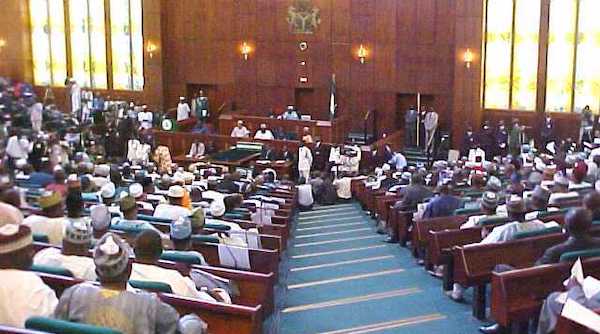News
Nigerian govt officials too desperate to sign loan agreements —Reps

The House of Representatives on Monday accused Nigerian government officials of too much desperation in signing loan agreements at any condition.
The Chairman of the House Committee on Treaties, Protocols and Agreements, Nicholai Ossai, stated this in Abuja on Monday during an investigative hearing on foreign loans and commercial agreements.
Ossai said: “The loan agreements we have seen so far show that government officials charged with the responsibility of representing Nigeria in these issues are more desperate to just take the loans at any condition, possibly using non-negotiated loan agreement templates rather than go through the rigour of diligent technical review of negotiating specific clauses with clarity and for national interest.”
Ossai, who equally faulted the sovereignty clause in Nigeria’s loan agreement with China, describing it as dangerous, further clarified in his opening speech at the hearing that the probe was not limited to Chinese loans and commercial contracts.
Ossai stated: “We will like Nigerians to know that we are not focusing on only Chinese loans. From what we know, Nigeria has over 500 bilateral loan/commercial contract agreements and investment treaties with different countries and institutions. There is no way the committee will do a thorough job without segmenting the issues based on countries, institutions or MDAs.
The committee chairman further revealed that Nigeria’s loan agreement with the Asian country was being governed by Chinese laws. This, he said was despite the fact that the Federal Government in 2014 signed an Executive Order providing guidelines on waiver of sovereign immunity during loan and commercial agreement negotiations.
According to Ossai, Nigerian officials had been violating the order.
Read also: Nigeria’s $1.5bn World Bank loan delayed over failure to implement reforms
The Minister of Transportation, Rotimi Amaechi; Minister of Works and Housing, Babatunde Fashola; Minister of Communications and Digital Economy, Ali Pantami; Minister of Police Affairs, Muhammad Maigari; and Minister of the Federal Capital Territory, Mohammed Bello were among members of the executive arm of government present at the hearing.
Others included the Director-General, Debt Management Office, Patience Oniha; Permanent Secretary (Special Duties in the Ministry of Finance), Aliyu Ahmed and Director, Legal Services, Gabriel Christopher, both representing the Ministry of Finance, Budget and National Planning.
Speaking further in his opening address, Ossai stated that the controversial clauses and agreements had been existing before the Muhammadu Buhari-led regime, adding that the probe was not about the ruling All Progressives Congress (APC) or the Peoples Democratic Party (PDP).
He also stated that it was a common practice that most international loan agreements would adopt ‘sovereign guarantee’ and a neutral international arbitration centre.
He said: “Even in situations where countries, out of desperation and weak economic position, waive their national sovereignty in bilateral or contractual agreements, the immunity of sovereignty waiver clause will usually be clear and categorically state specific assets associated with the loans for takeover in the event of default.
“However, the immunity clauses in most of these agreements before us are not only ambiguous, but also very obscure and without recourse to the fact that the Nigerian government had issued a circular on the subject matter with Reference Number SGF/OP/1/S.3/X/1739, dated 11th August, 2014, which is an Executive Order, that provides guidelines on issues of waiver of sovereign immunity clause during loan and commercial agreement negotiations.”
He also claimed that arbitration centres for bilateral loan agreements are known to be generally in neutral places, “unlike what we have in most of the Nigeria/China agreements where Hong Kong that is also governed by China laws was designated as the arbitration centre.”
He also explained that government agencies sign commercial agreements in billions of dollars before going to the Federal Executive Council for approval to execute them, adding that they proceeded to negotiate the terms of the loans before coming back to the President, who would be asking the National Assembly for approval for billions of dollars to do projects without attaching the negotiated loan and commercial contract agreements details.
He added: “This approach is the reason we have government representatives signing empty pages of loan agreement repayment schedule and other key documents required for the loan agreements to become effective.
“We have commercial contracts signed in US dollars, while the loan agreements for the execution of the same contracts were signed in Chinese Yuan currency in the Ministry of Communications and Digital Economy/Galaxy Backbone Limited.”
According to Ossai, the panel also noticed from documents that commercial contracts’ prices signed by the Federal Ministry of Transportation alone were over $33bn “without any clear cut financing arrangements.”
“Most of these commercial contract agreements didn’t also have local content clauses and were witnessed by non-properly designated and authorised officials”, he said.
The panel’s chairman also said there were issues relating to procurement process, evidences of 15 per cent advanced payments, payment of management fees, drawdown process and remittances “and a whole lot of other matters,” which the lawmakers are strongly poised to ask questions about
Ossai also said the loan on Nigeria’s parboil rice processing project under the Federal Ministry of Agriculture and Rural Development worth $326m had yet to be disbursed four years after signing the loan agreement.
Join the conversation
Support Ripples Nigeria, hold up solutions journalism
Balanced, fearless journalism driven by data comes at huge financial costs.
As a media platform, we hold leadership accountable and will not trade the right to press freedom and free speech for a piece of cake.
If you like what we do, and are ready to uphold solutions journalism, kindly donate to the Ripples Nigeria cause.
Your support would help to ensure that citizens and institutions continue to have free access to credible and reliable information for societal development.
























